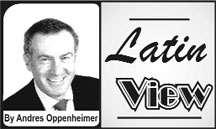Secretary of State Hillary Clinton may have spoken too fast when she denounced the release of about 250,000 confidential diplomatic cables by WikiLeaks as “an attack on America.” In the short run, the disclosures will hurt US diplomacy, but in the long run they may help restore the US image abroad.
If what we have seen in the first week of disclosures is the most juicy part of this unprecedented leak of diplomatic cables, it will undoubtedly make life more difficult for US diplomats in coming weeks.
The Obama administration will be hit from all sides. US allies across the world will feel betrayed by Washington. Countries such as Saudi Arabia, which according to the cables repeatedly urged Washington to attack Iran and destroy its nuclear program, will ask Obama: How can we possibly trust the United States when our secret conversations end up splashed across the headlines of the world’s biggest newspapers?

And US conservatives will blast the Obama administration for not siding with right-wing forces in countries such as Honduras, where the military ousted pro-Chávez former populist President Manuel Zelaya last year, before the country held free elections that restored democracy.
So in coming months, the United States will get a beating. A new poll conducted in 18 Latin American countries by the Latinobarometro shows that Obama – alongside Brazilian President Luíz Inácio Lula da Silva – is the most popular foreign leader in the region, with a 73 per cent approval rate each. Expect Obama’s figures to fall somewhat in next year’s poll.
Long-term gain
But in coming years, when the WikiLeaks diplomatic notes fade from the headlines and make their transition to the less-agitated world of historians, the massive array of diplomatic cables may help disarm conspiracy theorists around the world.
Today’s big headlines, such as Clinton’s question to the US Embassy in Buenos Aires about Argentina’s President Cristina Fernández de Kirchner’s mental health, will go down in history as fascinating footnotes. But, as any country’s diplomat will tell you, that’s the kind of things foreign service officers often write about in their cables.
So far, the WikiLeaks cables have not backed up any of the wildest conspiracy theories circulating on the blogosphere, such as that former President George W Bush – and not al Qaeda – was behind the 9/11 attacks, or that Bush’s disastrous invasion of Iraq’s main goal was seizing Iraq’s oil reserves, or that the US diplomats in Latin America are secretly plotting with opposition politicians to topple unfriendly regimes.
No conspiracy
There are 696 mentions of the name “Chávez” in the WikiLeaks cables, but the Venezuelan leader may be disappointed that, until now, nothing has come out to prove his claims that Washington is conspiring to oust him.
In fact, the cables show that the Obama administration stood up for democracy even when that required siding with anti-American populist leaders, such as Honduras’ Zelaya.
Against the wishes of the pro-US Honduran business community, US Ambassador to Honduras Hugo Llorens reported in a confidential cable on June 28, 2009, that Zelaya’s “forced removal by the military was clearly illegal,” and [Roberto] Micheletti’s ascendance as “interim president” was “totally illegitimate.”
My opinion: It’s too early to tell because thousands of cables remain to be scrutinized, and we may still find evidence of US cowboy diplomacy. And, granted, there are other US government cables from various intelligence agencies that are not included in the WikiLeaks treasure box.
But barring some gross revelation of US dirty tricks abroad in upcoming WikiLeak cables, the fact that a quarter-million confidential US diplomatic notes contain no evidence to back up some of the craziest conspiracy theories circulating worldwide should help put the latter to rest, at least among reasonable people.
In a weird way, what’s a major embarrassment for Clinton today may end up helping restore the US image abroad tomorrow.
© The Miami Herald, 2010. Distributed by Knight Ridder/Tribune Media Services.





